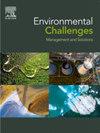Behavioral drivers of waste cooking oil recycling in China’s catering industry: An economic perspective
Q2 Environmental Science
引用次数: 0
Abstract
Under the global sustainable development goals, biodiesel plays a crucial role in the energy transition; however, its growth is constrained by a limited availability of raw materials. Waste cooking oil from the catering industry serves as a high-quality resource for biodiesel production, yet its recovery remains inefficient. A mixed-method survey was conducted to investigate the factors influencing waste cooking oil recovery among catering workers in Guangdong Province, China. The analysis applied an extended Theory of Planned Behavior, and a two-stage approach was adopted for the data. First, structural equation modeling was used to identify the causal relationships influencing recycling practices. Subsequently, Bayesian network analysis was employed to validate these findings and explore complex behavioral patterns. Results from the structural equation modeling revealed that administrative factors and subjective norms directly and significantly impact both intention and behavior, while behavior control and management factors influence behavior more indirectly by primarily shaping intentions. The introduction of the Bayesian network analysis confirmed these pathways and further identified moral attitude as another critical determinant that should be considered. The scenario simulation results provide deeper reference perspectives, showing that economic factors are not the only determinants of environmental protection. Overall, the study concludes that administrative deficiencies and incomplete awareness, including moral attitudes, may be key barriers to current recycling efforts. These findings provide valuable insights for understanding the mechanisms influencing waste cooking oil recycling behavior, offering an evidence-based path to effectively promoting the recycling of waste cooking oil.
中国餐饮业废弃食用油回收的行为驱动因素:一个经济学视角
在全球可持续发展目标下,生物柴油在能源转型中发挥着至关重要的作用;然而,其增长受到原材料供应有限的制约。餐饮业的废食用油是生产生物柴油的优质资源,但其回收效率仍然很低。采用混合调查方法,对广东省餐饮从业人员废油回收的影响因素进行了调查。分析应用了扩展的计划行为理论,并对数据采用了两阶段方法。首先,利用结构方程模型确定影响回收实践的因果关系。随后,使用贝叶斯网络分析来验证这些发现并探索复杂的行为模式。结构方程模型结果表明,行政因素和主观规范对意向和行为都有直接而显著的影响,而行为控制和管理因素对行为的影响更为间接,主要是通过意向的形成。贝叶斯网络分析的引入证实了这些途径,并进一步确定道德态度是应该考虑的另一个关键决定因素。情景模拟结果提供了更深层次的参考视角,表明经济因素不是环境保护的唯一决定因素。总的来说,该研究得出的结论是,管理缺陷和意识不全,包括道德态度,可能是当前回收工作的主要障碍。这些发现为理解废食用油回收行为的影响机制提供了有价值的见解,为有效促进废食用油的回收利用提供了循证途径。
本文章由计算机程序翻译,如有差异,请以英文原文为准。
求助全文
约1分钟内获得全文
求助全文
来源期刊

Environmental Challenges
Environmental Science-Environmental Engineering
CiteScore
8.00
自引率
0.00%
发文量
249
审稿时长
8 weeks
 求助内容:
求助内容: 应助结果提醒方式:
应助结果提醒方式:


